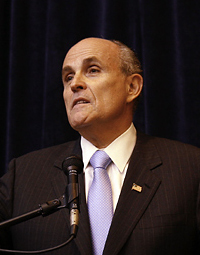Elizabeth Hartline Green
Where do the candidates stand on education? Rudy Giuliani on education.
 This is the first in an ongoing series on where the candidates stand on education.
This is the first in an ongoing series on where the candidates stand on education.
First up to bat? Mr. Rudolph Giuliani.
So, what does Giuliani think about education? Several things.
First, he is strongly in support of charter schools and vouchers; in fact, his education platform is focused mainly on expanding financing and access to charter schools and vouchers. Charter schools use government money to fund schools that are not overseen by traditional school districts, and vouchers give parents money from the government to pay for private school enrollment (charter schools are still public schools, and must abide by many of the same rules that other public schools do, while private schools with pupils receiving vouchers do not). In true Giuliani form, he went as far as to say that New York’s educational system should be “blown up” while promoting his New York voucher plan, though he has clarified publicly that, if president, he would not dismantle the U.S. education system. He also champions the thought that higher education has succeeded and primary/secondary education has failed because of the choice that students have in attending college, though the comparison between a system that is all-inclusive by law and one that selects its students is a bit peculiar.
Giuliani is no friend of teachers unions, and believes that special interests and unions are holding education back. During his tenure as mayor he refused to bargain with the teachers’ union about pay increases, and let city teachers go without contracts for over a year. He repeatedly railed against what he saw as the untenable bureaucracy in New York schools (despite the political influence he had on the Board of Education) and tried unsuccessfully to take over the schools. Later, Mayor Bloomberg successfully took control of the school system.
Meanwhile, Giuliani spent hundreds of millions of dollars increasing the funding to New York City’s art programs and reading programs, as well as to outfitting classrooms with computers. Though Giuliani was against spending more on teachers or lowering class sizes, he consistently funded projects that he saw as going directly to help students.
Giuliani also caused quite a stir with his higher education policies (specifically the city’s CUNY system) while mayor, and many of his appointments at CUNY were seen as being political in nature. His call for eliminating remedial education at CUNY and cutting back services negatively influenced those traditionally shut out from higher education—those struggling to attain higher education against huge obstaclesl.
Giuliani was very involved with New York’s education policies during his tenure as mayor, and made some very controversial decisions. Of course, Giuliani has a habit of causing controversy, but education policy has a certain penchant for getting everyone a little stirred up. We’re talking about decisions here that hit very close to home, affect nearly everyone, and directly shape future citizens.
59% of New York voters in 1999 disapproved of Giuliani’s education policies, and 70% were not satisfied with the quality of New York public schools under his leadership. He waged war on the system in place, an effort that many believe isolated any potential allies in the department of education and, in the end, undermined his push to fully reform the schools.
Elizabeth Hartline Green: Author Bio | Other Posts
Posted at 10:10 AM, Jul 27, 2007 in
Candidates on Education | Politics
Permalink | Email to Friend










